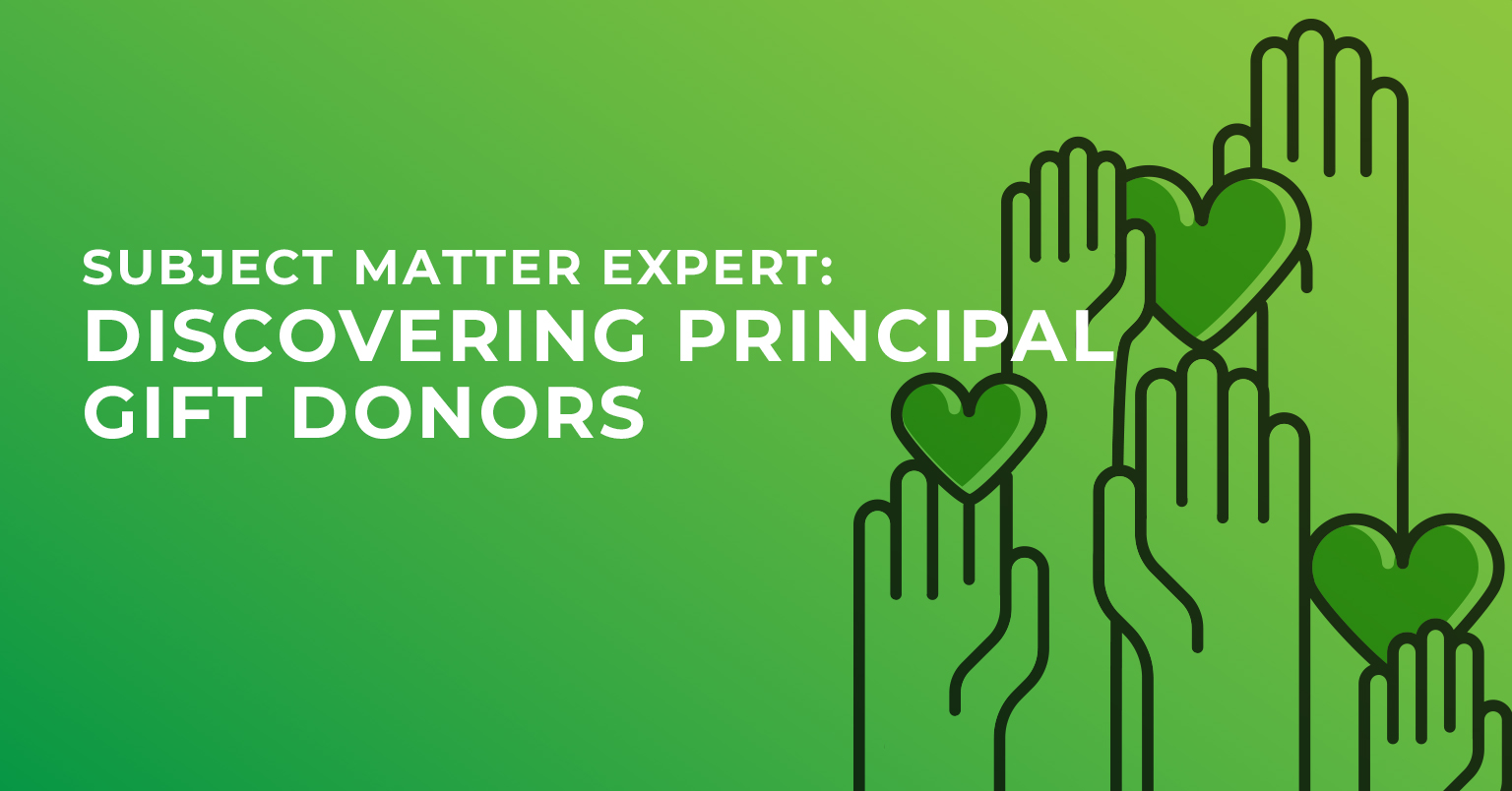
Discovering Principal Gift Donors
The fall weather has finally arrived down South, and I hope you are enjoying cooler temperatures and vibrant foliage at your home. In my last blog post, I explained the importance of principal gift fundraising programs, and while the investment amount of principal gifts may vary by organization, the transformational impact of the programs are universal. In this post, we will explore the attributes of principal gift prospects and how the impact of a successful principal gifts program hinges upon successfully uncovering these prospects.
One of my most favorite things to do as a gift officer – and yes, I will always be a gift officer – is Discovery work. It is a well-known joke on my team that I am always up for a Discovery visit. I am not sure if it is because I thought I would be an investigative reporter in college or my natural curiosity about people, but I love digging in and doing the research, asking open-ended questions that elicit responses, and helping pave the way for a suspect to become a prospect and ultimately a donor. And I firmly believe that, regardless of title or position on the org chart, every frontline fundraising Advancement professional should always be a good Discovery gift officer.
So what do you look for, and how do you unpack the attributes of principal gift prospects? Just because you know a billionaire who thinks highly of your institution’s president does not mean your organization will race to the top of his or her philanthropic priority list. It is important for principal gift fundraisers to do the hard work to uncover the unknown and cultivate a relationship that turns into a transformational gift conversation. This takes time, patience, and creativity. It is like dating: no one proposes on the first date! But if you dedicate time and effort and act with intention, a meaningful relationship based upon common objectives can be molded. Then when it’s finally time to pop the question, you’ll have already done the necessary work to secure the transformational gift.
Many of the attributes of a principal gift prospect seem obvious, while others require the assistance of a research partner or self-driven investigative work. I could tell story after story of homeruns that I have hit starting with just a name and ending with a transformational gift. Whether I’m working alone or with a partner, the following checklist is critical in evaluating the attributes of a donor:
- Do I know the true capacity of the individual or family unit?
- Are fancy toys part of the equation (planes, vacation homes, etc.)?
- Has there been a recent liquidity event (biomedical firm spins off a new device, company sells, etc.)?
- Are there proven philanthropic tendencies, and do I understand them?
- Is this the right life stage for the individual or family unit to consider a transformational investment?
- Have I mapped out the relationship the individual or family unit has to my organization and factored that into my discussion? For example, is this a grateful patient, and do I fully understand the relationship he/she has to the physician champion? Or is the individual the son/daughter of a famous researcher who cured a specific illness?
- Is this a “legacy” family unit (meaning my organization has impacted generations of the same family)?
- Where is this individual or family unit? Sometimes location matters while other times it does not.
As I continue to do Discovery work to uncover principal gift prospects, I use the questions above to minimize my organization’s risk associated with these important conversations. More specifically, I can adequately prepare top leadership to feel confident as they engage these prospects and help advance gift conversations. And for most donors, they are flattered to know that you know so much about them. It shows you have done your homework and invested the time to understand who they are. And as the conversations unfold and information is learned, it’s important to document in your CRM. My team hears me say all the time, “if it isn’t in the CRM, it didn’t happen!”
Discovery work is critically important to expanding your organization’s donor pipeline, especially at the top of the pyramid. It should be fun, and gift officers should be encouraged to be creative. Sometimes what we know helps us conduct an internal assessment of our prospects. But often, it is what we do not know that adds zeros to a gift conversation and ultimately defines the impact a donor has on an organization.
I challenge you to embrace Discovery work at the principal gift level. Set a goal for yourself or your team. I do it, and so should you, because you never know what might come from one conversation!
—-
ABOUT GOBEL SUBJECT MATTER EXPERTS: GOBEL Subject Matter Experts are healthcare philanthropy professionals working in some of the top shops in the country, sharing best practices and insights. For more information about GOBEL’s Subject Matter Expert program, or to suggest a topic for coverage, email jmoody@gobelgroup.com.
ABOUT THE AUTHOR:
Will Whiting is a Subject Matter Expert for GOBEL. He serves as Executive Director of Principal and Presidential Gifts at the University of Texas at Austin. Will is inspired by the generosity of others and the impact of transformational gifts, and he strives daily to make those gifts of a lifetime occur.
